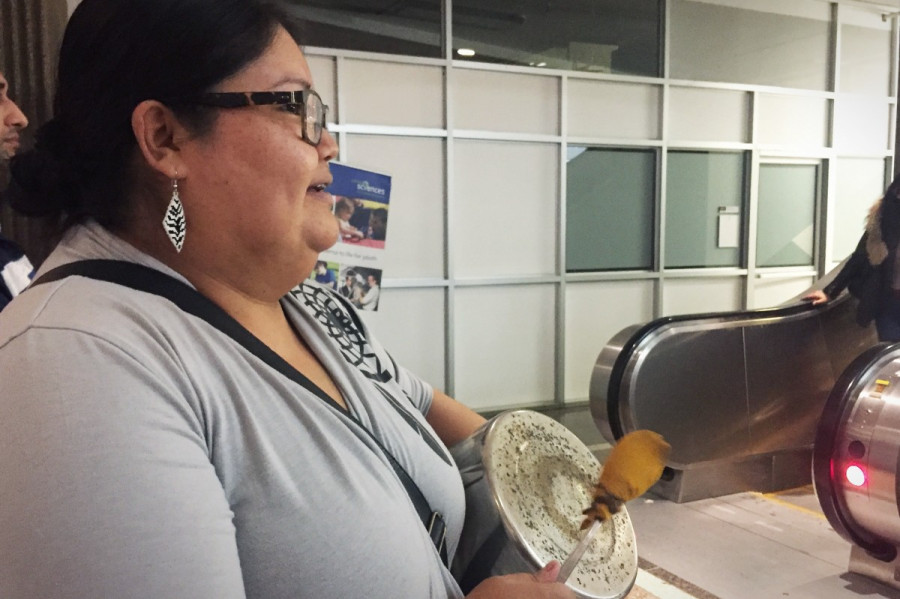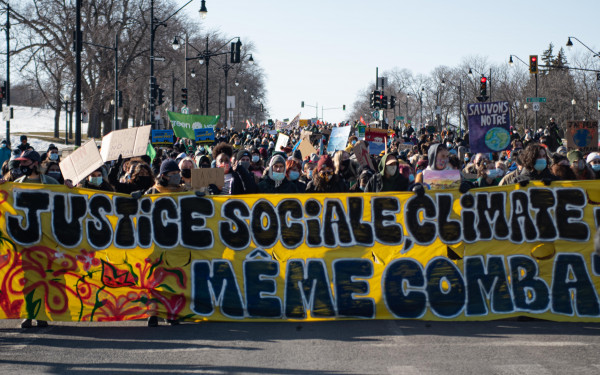First Peoples Studies Class Stands in Solidarity With Standing Rock
Students Takes Mobilization Out of the Textbook and Into Public Space
Professor Donna Goodleaf’s Haudenosaunee Peoples class put what they were learning into action on Thursday afternoon, as they demonstrated in solidarity with Standing Rock in Concordia’s Hall building downtown.
“We were on the chapter of mobilization and we were learning about the Oka Crisis,” explained student Heldden Byumvuhore. Goodleaf, she said, related the lesson to the ongoing occupation of Standing Rock, in opposition to the proposed Dakota Access Pipeline.
Much like the Oka Crisis, the demonstrations in North Dakota “started very small,” said Stephen Karchut, another student in the class. “Now look at it. It’s getting international news every day of the week,” he said.
Indigenous peoples and non-Indigenous allies have been protesting the construction of the DAPL through the Standing Rock Sioux Reservation in North Dakota since last spring. Encampments in Standing Rock have been growing since, with reports of over 100 First Nation tribes occupying the land surrounding the reservation.
Despite the fact that the demonstration took place during class time, with the first students arriving at 2:30 p.m., student participation was self-motivated, explained Karchut. The class of approximately 35 students began contributing ideas, and within a week, had organized the demonstration. “This wasn’t mandated by our teacher,” Karchut said.
He explained that in organizing the demonstration, it put what they were learning into practice, giving the material present-day context. “In the First Peoples Studies Program, we learn more about historical fact,” Karchut said. “We learn a lot about problems that arising for first peoples.”
Through chants of “No More Dakota Access Pipeline!” Goodleaf said academics can no longer stand-by idly as Indigenous lands are being destroyed by energy projects.
“It’s not enough for us to be sitting in the classroom and just talking, when we’re not applying theories to action,” she said. The effects of this pipeline, and others like it, Goodleaf emphasized, have a far reach, and will impact communities across North America. “What’s happening there, is happening here,” she said. “We’re not safe.”
The university announced on Nov. 2 that two special advisors, Elizabeth Fast and Charmaine Lyn, had been hired with the mandate of implementing the recommendations of the Truth and Reconciliation Commission. Fast is Métis and Mennonite, and Lyn has extensive experience in community engagement, particularly with marginalized populations.
Goodleaf stressed the importance of including Indigenous peoples in these conversations, especially at administrative levels. “They need to allow us to be the forefront to organize and to decide how we see what is best, in terms of implementing [strategies].”
“It’s always outsiders organizing these committees on behalf of trying to better the university […] but we’re never asked to sit at the table,” said Goodleaf. “Our voices need to be […] at the table at every single level.”


_600_832_s.png)

ED1(WEB)_600_375_90_s_c1.jpg)


